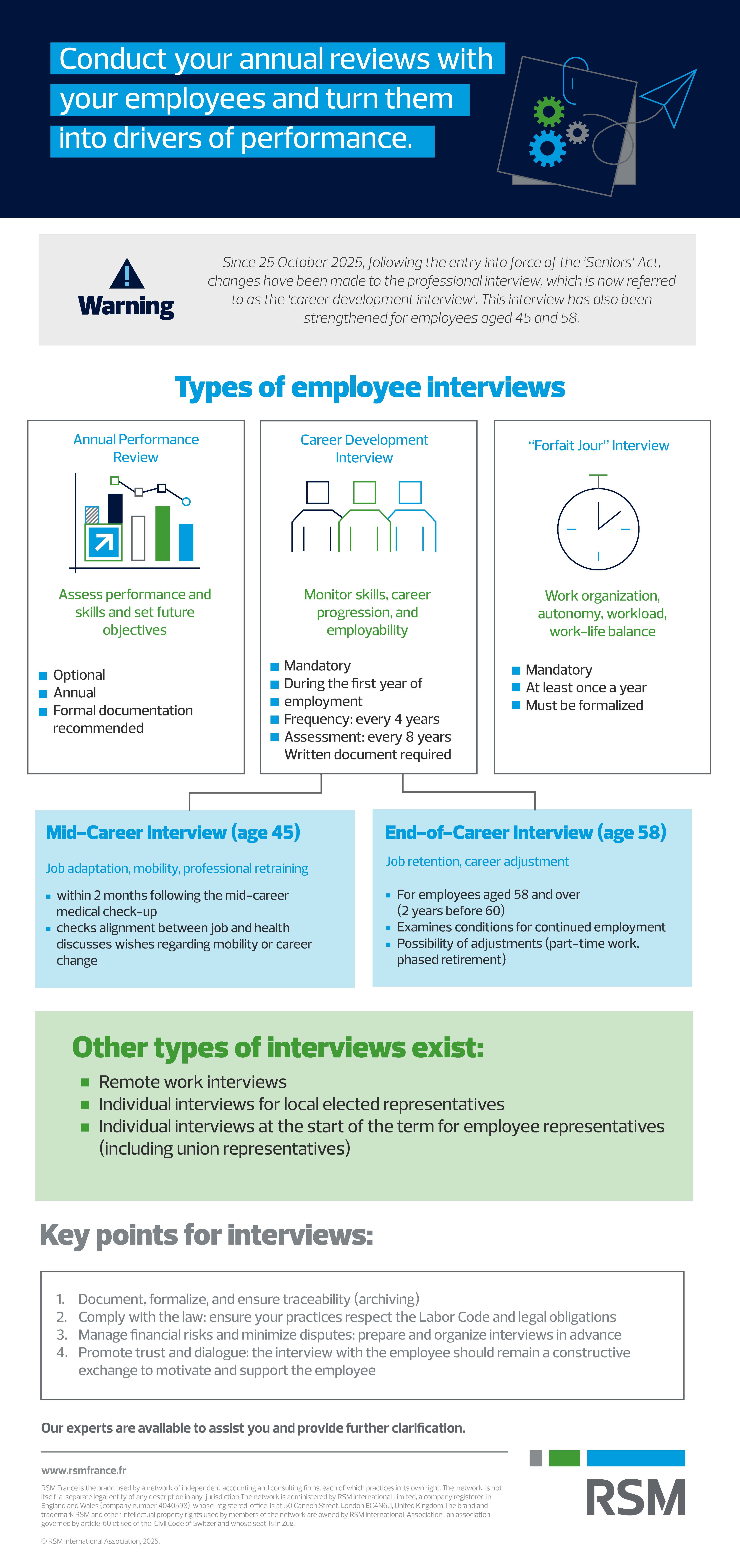Professional interviews are essential tools for managing human resources
They also play a key role in supporting employee development
Our expert offers here a comprehensive guide to the main types of interviews and best practices for conducting them
The end of the year is a period traditionally associated, for companies, with annual reviews for their employees.
This year, the entry into force of the “Seniors Act” (Act No. 2025-989 of 24 October 2025, published in the Official Journal on 25 October) is reshuffling the deck by reforming the professional interview (mandatory in all companies), now renamed the “career development interview” for all employees. This interview is strengthened for employees aged 45 and adjusted for those aged 58 and over.
Our expert therefore proposes to take stock of the main interviews relating to the performance of the employment contract, excluding those linked to recruitment (prior to hiring) and those associated with disciplinary procedures or termination of the contract (mutual termination agreements, dismissal for personal or economic reasons).
Overview of the main interviews and your corresponding obligations:
- the “annual performance review” (optional, except in specific cases);
- the “career development interview” (formerly the “professional interview”);
- the “working time in days” interview, required when an individual days-based working time agreement has been concluded with the employee (mandatory).
Professional interviews are essential tools for managing human resources and supporting employee development. Covering skills assessment, career planning, and work organisation, their legal framework is precise and their implementation must be rigorous.
→ View our infographic on these interviews here
Annual performance review: measuring and supporting performance
Objectives and Legal Framework
The purpose of this interview is to assess the employee’s performance and skills in their current role.
It also provides an opportunity to review achievements against previous objectives, set new goals for the coming year, and identify training needs.
The employer is entitled to assess employee performance as part of their management authority. However, there is currently no legal obligation to establish a performance evaluation system.
In practice, evaluation methods vary according to the company’s HR policy.
Any evaluation process must comply with legal requirements, case law (including prior consultation with the Social and Economic Committee - CSE), and the General Data Protection Regulation (GDPR).
Modalités de l'entretien
Before implementation, all evaluation methods and techniques must be communicated to employees (Article L1222-3 of the French Labour Code) and presented to the CSE. In addition, if personal data is collected during the interview, employees must be informed beforehand (Article L1222-4 of the French Labour Code).
Refusing to attend an evaluation interview may, in principle, justify disciplinary action. However, care must be taken when drafting the interview report: the employer has a duty of fairness and must respect the employee’s dignity, especially when requesting a signature.
Evaluation results can have a direct impact on an employee’s career, pay, training, or even contract termination. Employers must therefore safeguard individual rights and freedoms and take measures to prevent discrimination (Article L1121-1 of the French Labour Code).
→ In general, this interview should take place in an environment that fosters mutual trust. It should serve as a managerial tool for mutual progress, not as a disciplinary meeting.
Career Development Interview: Ensuring Employee Employability
Objectives and legal framework
Since the reform, every employee is entitled to a career development interview within the year following their hiring, and then every four years (instead of every two previously). A comprehensive review is conducted every eight years.
This interview, distinct from the performance review, is mandatory for all companies regardless of their size. It is designed to assess (Art. L 6315-1 of the Labour Code):
- the employee’s skills and the qualifications used in their current role, as well as their potential development in light of the company’s transformations;
- the employee’s professional situation and career path, in relation to changes in the business lines and employment prospects within the company;
- training needs (related to their professional activity, changes in their role due to company transformations, or a personal project);
- the employee’s wishes regarding career development;
- the employee’s use of their personal training account (CPF) and any top-ups made to this account.
Important: Unlike the performance review (skills assessment), which can be a useful complement to the career development interview, the latter is mandatory regardless of the company’s workforce size.
Enhanced interview procedures
The career development interview must also be offered at key moments: return from maternity, parental or sabbatical leave, long-term sick leave, or a union mandate, among others. It can even be organised before the employee’s actual return to their position, at their request.
Two new steps further strengthen the system:
- the mid-career interview (at age 45), within two months following the mid-career medical check-up, to assess the alignment between the position, the employee’s health, and their career prospects;
- the end-of-career interview (from age 58 onwards), focusing on job retention, workplace adjustments, and arrangements for progressive retirement.
Companies and employees may rely on OPCOs or external organisations to prepare these interviews.
Key Points of Attention & Employer Obligations
In companies with 50 or more employees, a corrective top-up to the CPF is required if, over eight years, the employee has not benefited from the mandatory interviews and at least one training course.
For companies with fewer than 50 employees, no direct financial penalty applies, but failure to provide training may expose the employer to liability before the labour courts.
Finally, the reform introduces:
- the inclusion of an overview of interviews and training actions in the BDESE;
- the possibility for a collective agreement to redefine the frequency or content of interviews (up to a four-year interval);
- a specific interview at the request of employees holding an elective mandate (municipal, regional, or departmental councillors).
→ Complying with the new obligations relating to the career development interview is crucial to securing HR management and preventing potential litigation. Rigorous formalisation is also a strategic lever for employee retention and skills development.
“Forfait-Jour” interview: managing autonomous work
Objectives and legal framework
This interview applies to employees working under a “forfait en jours” agreement (fixed number of working days per year) as defined in Articles L3121-58 to L3121-62 of the French Labour Code.
The purpose of the interview is to discuss the employee’s workload—ensuring it remains reasonable—as well as their work organization, work-life balance, and remuneration (Article L3121-65 of the French Labour Code).
This interview is mandatory for employees under a “forfait en jours” agreement.
Interview procedures
At a minimum, the interview must be held annually. However, sectoral or company-level agreements may provide for more frequent meetings. For evidentiary purposes, it must be documented in writing.
Our RSM expert's advice :
If the interview is not conducted, the “forfait en jours” agreement becomes null and void. Its proper execution and documentation are therefore crucial to comply with the law and to mitigate litigation risks.
In such cases, the employee’s working time reverts to the standard legal framework—35 hours per week (Article L3121-27 of the French Labour Code). This can create significant financial exposure, particularly regarding back pay for overtime within the three-year limitation period.
Moreover, the absence of this interview may also entitle the employee to claim damages for unfair execution of the “forfait en jours” agreement.
Holding and properly documenting professional interviews is a genuine performance lever for companies. When conducted effectively, these interviews help assess skills, support career development, and maintain employability, while ensuring legal compliance and reducing litigation risks.
In addition to annual performance, professional development, and “forfait-jour” interviews, the law also provides for other specific meetings, such as:
- The telework interview (art. L1222-10 du Code du travail),
- The individual interview for local elected officials (art. L6315-2 du Code du travail),
- The individual interview at the start of the mandate for staff representatives, including union representatives (art. L2141-5 du Code du travail).
A structured, consistent, and well-documented approach to all these interviews not only secures HR practices but also strengthens employee motivation and performance, fostering trust and long-term engagement.

RSM experts, specialists in HR, social & payroll consulting, assist businesses across all sectors in defining and implementing their strategy. Our tailored solutions are adapted to the size, maturity, and industry of your company.
Discover our HR, social & payroll consulting services.





